Murkowski Announces Results of Interior Funding Negotiations, Funding Bill to Strengthen Alaska’s Tribes, Lands and Parks
Ranking Republican on Subcommittee Shares Results of FY2015 Senate Interior Appropriations Bill Negotiations
Senator Lisa Murkowski is proud to share the results of her negotiations with Senate Interior Appropriations Subcommittee Chairman Jack Reed (D-RI) through the release of today’s draft fiscal year 2015 Senate Interior Appropriations bill. With the Department of the Interior managing a majority of Alaska’s lands, forests and waters – in addition to providing oversight of many services and programs for Alaska Natives and tribes – this bill has a significant impact to Alaska.
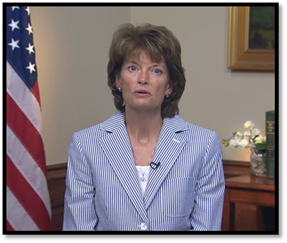
(Click image to view Senator Murkowski’s statement.)
“As the Chairman and Ranking Republican of the Interior Appropriations Subcommittee, Senator Reed and I sat down together to craft a bill that responsibly funds the Department of the Interior’s far-reaching programs, while also addressing some core Alaskan priorities,” said Murkowski. “I look forward to improving this bill further by opening up the conversation to other Senate colleagues on the subcommittee.”
Murkowski was able to leverage her position as Ranking Republican on the Committee to prioritize Alaska Native health care needs, public land usage, rural infrastructure, justice and public safety.
Alaska Tribal Priorities and Rural Communities
Full Funding of Contract Support Costs (CSCs): On the heels of Senator Murkowski’s major victory for Alaska’s first people this past January – where she made sure that tribal health centers finally received the full funding they deserve in the 2014 fiscal year – Murkowski secured full funding for all Bureau of Indian Affairs and Indian Health Service CSCs This will send over $200 million to tribal health providers allowing them to improve the delivery of health services.
Background: For years, the administration shortchanged tribes nationwide by funding less than full contract support costs for the BIA and IHS, despite a Supreme Court ruling (Ramah) requiring them to. It was Murkowski’s work in conjunction with her subcommittee colleagues, which culminated earlier this year, which helped halt this practice.

(Dentists chairs ready for Alaskans at the Benteh Nuutah Valley Native Primary Care Center)
Staffing of facilities: The bill provides full funding of the request of $71 million for staffing of new facilities across the nation. In addition, full funding is provided to maintain staffing packages for facilities opened in Alaska during the past year and operated by the Southcentral Foundation, Norton Sound Health Corporation, Tanana Chiefs, the Barrow Hospital, Copper River, and Kenaitze. The staffing packages will bring hundreds of jobs to communities.
Promoting and Empowering Tribal Justice: Today’s bill not only includes over $351 million to support public safety and justice programs, but requires the Department of the Interior to review and provide a report on the funding needs of tribal courts in states like Alaska that do not currently receive dedicated tribal court funding.
Safe Drinking Water and Wastewater Funding: In contrast to the steep cuts proposed by the administration, Senator Murkowski helped secure a $4.1 million increase in support of Alaska’s efforts through the EPA’s State Water Revolving Funds program for a total of $17.3 million.
Rural Water Infrastructure: The bill includes $10 million for EPA's Alaska Native Villages program which provides grants to implement critical wastewater and drinking water projects for Alaska Natives.
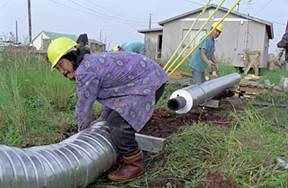
(Installing water pipes in Selawik.)
Supporting Native Children’s Unique Needs: Already the co-sponsor of a bipartisan bill to create a Commission on Native Children, Senator Murkowski supported language in the 2015 Interior funding bill to promote interagency collaboration to streamline efforts to improve “health care, social service, child welfare and juvenile justice programs.” Murkowski believes these preliminary efforts will create a better foundation for the future commission to fully serve Native youth nationwide.
Alaska Subsistence: A year after Senator Murkowski pushed back against the administration’s attempt to cut the Fish and Wildlife Service’s budget for the Alaska Subsistence Program, its funding level this year remained constant at $12.4 million. The program promotes and regulates subsistence use on federal lands by overseeing harvest assessments and resource monitoring, conducting population assessments, and participating in Native outreach and education. In addition, the Forest Service’s proposal to eliminate $2.5 million for the subsistence program was rejected and these funds were restored in the bill.
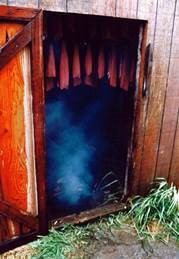
(A salmon smokehouse in Chignik.)
Lands and Forests
Resources and Accountability on Contaminated ANCSA lands: In 1998, the Department of the Interior submitted a report to Congress acknowledging that it conveyed approximately 650 contaminated sites through the Alaska Native Claims Settlement Act (ANCSA). No significant efforts have been made by the Department to clean up these sites since this report was issued. The bill requires that Interior provide an updated report which includes not only an inventory of these sites but a detailed plan for how the Department intends to remediate them.
Land Conveyance Funding Restored: The federal government’s conveyance program of land owed to Alaska and Alaska Natives is mandated under the 43-year-old Alaska Native Settlement Claims Act (ANCSA). In order to speed up this process, Senator Murkowski passed the Alaska Lands Transfer Acceleration Act in 2004. However, the President’s budget slashed the funding for Alaska land conveyance work. Murkowski was able to restore the funding to $22 million to further provide Alaskans and Native Corporations final title to lands selected under the Alaska Statehood Act and ANCSA
Alaska Red Cedar: Murkowski included language in the bill requiring that timber sales in Alaska be economic and for the U.S. Forest Service to use an appraisal system best suited to the unique needs of Alaska.
Seismic Monitoring
More Alaska Volcano Observatory’s Work: With activity from the “Ring of Fire” a regular occurrence, Alaskans rely on the Alaska Volcano Observatory’s ability to detect threats to life, health and the state’s economy. Senator Murkowski included language in today’s bill that will increase the United States Geographical Survey Volcano Hazards program by an additional $2 million to assist the Survey in repairing and upgrading current systems. Several of the current seismic monitors are currently inoperable and maintenance is needed to continue rapid detection of these volcano threats.
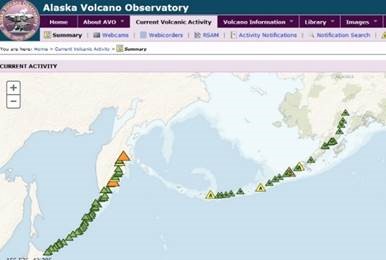
(The Alaska Volcano Observatory’s important work available online.)
Alaska Mapping Gets a Boost – Accurate, up-to-date topographic maps are necessary for aviation safety, energy development and resource assessments. Much of the state’s topographic maps are more than a half-century old. The bill includes $3 million for the U.S. Geological Survey’s Alaska Mapping Initiative, which will be used to acquire data needed to provide accurate, current and publicly accessible statewide topographic maps.
Celebrating and Improving Alaska’s National Parks
Katmai National Park, Brooks Lodge – With $4.4 million being provided to upgrade the current bridge to Brooks Falls to provide better public access and avoid human-bear interactions, Senator Murkowski included language directing the National Park Service to stop any consideration of using funds to relocate the Brooks Lodge in Katmai National Park based on an outdated land use plan. This historic lodge is enjoyed by many Alaskans and tourists from around the world who get a unique opportunity to observe bears up close in the wild.
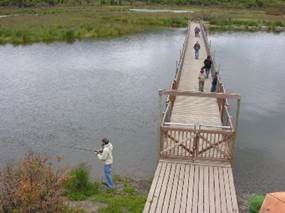
(Current floating bridge in Brooks Falls.)
Boosting the “Centennial Challenge”: Unfortunately, the National Park System faces significant disrepair and aging facilities in advance of its 100 year anniversary. Today’s bill includes a one-time $35 million increase for maintenance, youth and volunteer programs, and other discretionary expenses – with an incentive for private-public partnerships.








